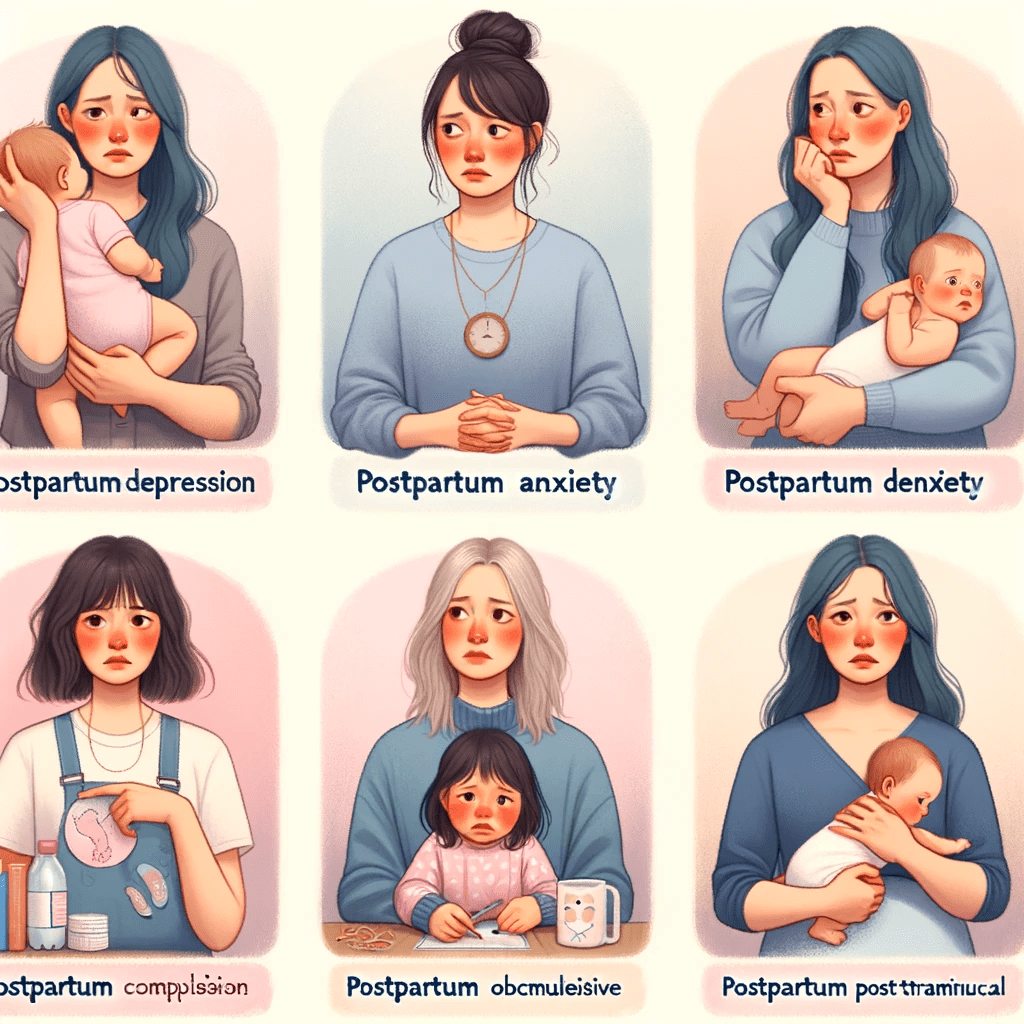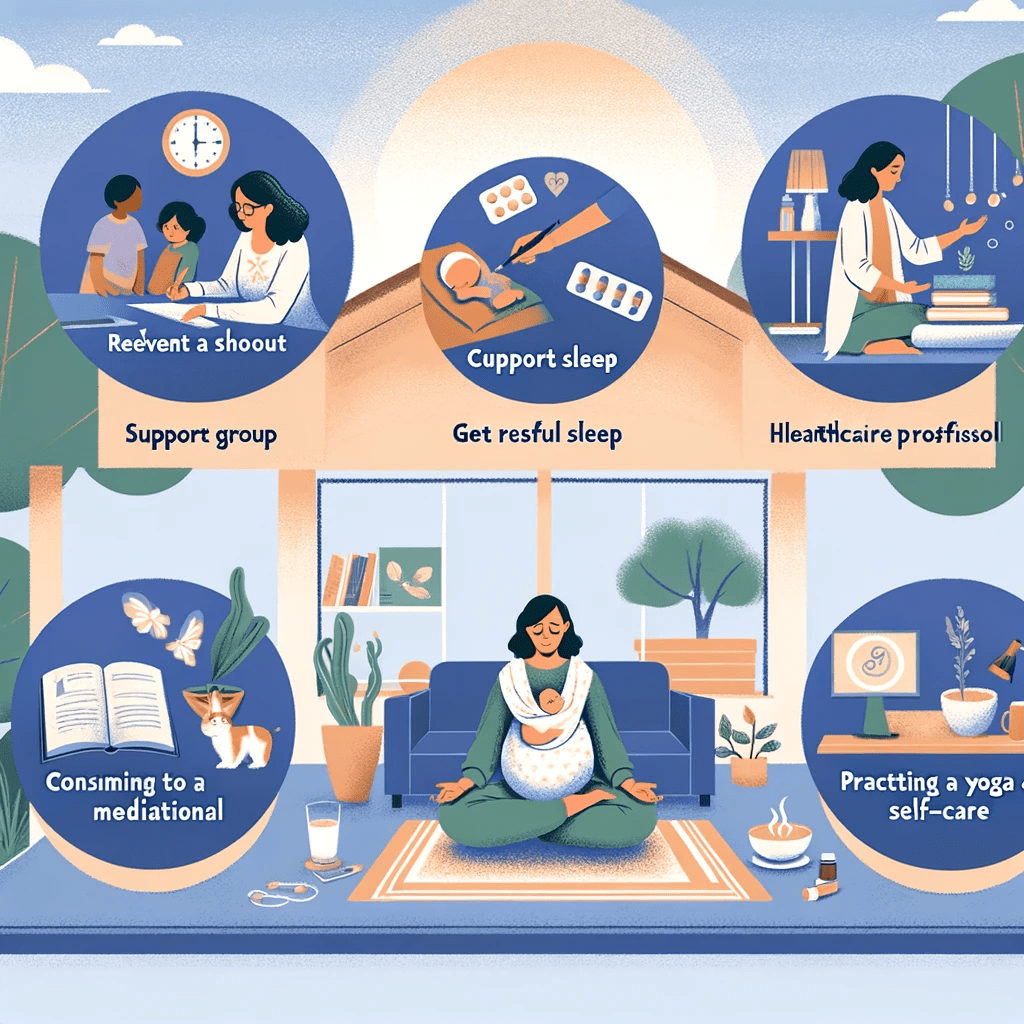This article provides an easy-to-understand guide on postpartum depression (PPD). It explains what PPD is, its symptoms, and the different types like anxiety and stress disorders that new moms might face. The article gives practical tips on how to prevent PPD, like getting enough sleep and having a good support system. It also talks about ways to treat PPD, including medication and therapy. Real stories from moms who’ve been through PPD are shared, showing that recovery is possible. The article is useful for new moms or anyone wanting to learn more about PPD in a simple, clear way.
Introduction & Definition

Postpartum depression (PPD) is a mental health condition that affects many new mothers, characterized by a complex mix of emotional, physical, and behavioral changes after childbirth. Understanding PPD is crucial for both expecting and new mothers. This condition goes beyond the typical ‘baby blues,’ presenting a more profound and persistent form of emotional disturbance. In this comprehensive guide, we delve into the symptoms, prevention methods, and treatment options for PPD, aiming to provide support and knowledge to those navigating this challenging phase of motherhood.
Understanding Postpartum Depression
Symptoms, Types, Statistics and prevalence of Postpartum Depression

Postpartum depression (PPD) is a complex condition that varies in symptoms and intensity. About 15% of new mothers experience PPD, with symptoms ranging from fatigue and feelings of sadness to severe mood swings and loss of interest in activities. It’s essential to recognize these signs early as they can last over two weeks and significantly impact a mother’s well-being [“].
PPD is not a singular entity but a part of a spectrum of postpartum mood disorders. This spectrum includes:
- Postpartum Anxiety (PPA): Affecting about 10% of postpartum women, PPA may occur with or without depression. Symptoms include changes in eating and sleeping habits, racing thoughts, constant worry, and physical symptoms like dizziness and nausea [“].
- Postpartum Obsessive-Compulsive Disorder (PPOCD): Experienced by 3-5% of postpartum women, PPOCD involves compulsive behaviors and obsessive thoughts, often revolving around the baby’s safety [“].
- Postpartum Post-Traumatic Stress Disorder (PPTSD): This condition affects 1-6% of women and is usually triggered by traumatic experiences during childbirth. Symptoms include nightmares, flashbacks, anxiety, and avoidance of reminders of the event [“].
- Postpartum Psychosis (PPP): The most severe but rarest form, PPP affects about 1 to 2 out of every 1,000 pregnancies. It’s characterized by a loss of touch with reality, bizarre behavior, hallucinations, and rapid mood swings [“].
- The “Baby Blues”: Affecting 50% to 75% of new mothers, this is the least severe form and typically resolves on its own within a couple of weeks. Symptoms include mood swings, crying spells, and feelings of anxiety and overwhelm [“].
Understanding these different forms of postpartum mood disorders is vital for early detection and effective management. In the next section, we’ll delve into the methods to prevent PPD, offering strategies that can be employed even before the onset of symptoms.
Methods to Prevent Postpartum Depression

1. Community Support
Having a strong support system is crucial for new mothers. The presence of friends, family, or even virtual communities can greatly enhance a mother’s well-being during the postpartum period. In many cultures, living with parents or having them move in during the initial months is a common practice. For those without this option, online support groups offer a valuable resource [“] [“].
2. Adequate Sleep
Sleep deprivation significantly affects mental health. New mothers often face disrupted sleep patterns, making it vital to seek help for childcare to ensure better rest. Partners, friends, and family can play a significant role in providing support to allow new mothers to get the sleep they need [“].
Several studies have examined the relationship between sleep quality during and after pregnancy and the risk of developing PPD:
- McEvoy et al. (2019) Study: This study found that poor postpartum sleep quality is a predictor of subsequent postpartum depressive symptoms in a high-risk sample. The research, published in the Journal of Clinical Sleep Medicine, emphasizes the significant impact of sleep quality on postpartum mental health [“].
- Sit et al. (2015) Study: This research explored the associations between suicidal ideation in depressed postpartum women and various factors including childhood trauma, sleep disturbance, and anxiety. The study, published in the Journal of Psychiatric Research, highlights the complex interplay between sleep and mental health in the postpartum period [“].
- Okun (2015) Study: The study, published in Current Opinion in Psychiatry, focuses on the relationship between sleep and postpartum depression. It underscores the importance of sleep in the context of PPD, suggesting that sleep quality and duration can significantly influence postpartum mood [“].
- Lewis et al. (2018) Study: Published in BMC Women’s Health, this research examines the effect of changes in sleep patterns on postpartum depressive symptoms. It provides insights into how alterations in sleep after childbirth can impact a mother’s mental health [“].
- Hiscock et al. (2014) Study: This randomized trial, published in Pediatrics, investigated the prevention of early infant sleep and crying problems and their relationship with postnatal depression. The study provides evidence supporting the connection between infant sleep issues, maternal sleep quality, and the risk of PPD [“].
3. Seeking Professional Help
Early diagnosis and treatment of postpartum depression are essential. Treatment typically involves a combination of medication and therapy, and reaching out for professional help as soon as symptoms are recognized is crucial for effective management [“] [“].
4. Adhering to Treatment Plans
For those with a history of depression or undergoing treatment during pregnancy, continuing prescribed medications or therapies is important. Many antidepressants are safe to use throughout pregnancy and breastfeeding [“].
5. Self-Care
Engaging in self-care activities during and after pregnancy is vital. This includes relaxation techniques, maintaining a healthy diet, and staying physically active.
6. Preparation for Motherhood
Preparing mentally for motherhood can alleviate the risk of PPD. This can involve discussing concerns with a partner, working with a therapist, reading parenting books, or attending prenatal classes. Addressing doubts and concerns pre-emptively can instill confidence in new mothers.
In the next section, we’ll discuss the treatment options available for PPD, providing a comprehensive understanding of how these methods aid in recovery.
Treatment Options for Postpartum Depression

Medication
Medication, particularly antidepressants, plays a crucial role in the treatment of PPD. These medications help to balance the chemicals in the brain that affect mood and emotions. It’s important for new mothers to discuss medication options with their healthcare provider, especially when breastfeeding, to ensure the safety and well-being of both mother and baby.
Therapy
Therapy, particularly cognitive-behavioral therapy (CBT) and interpersonal therapy (IPT), has proven effective in treating PPD. These therapies help mothers process their experiences, cope with the changes in their lives, and develop strategies for managing their emotions and thoughts.
Combination Treatments
Often, a combination of medication and therapy is the most effective treatment for PPD. This holistic approach addresses both the biochemical and emotional aspects of the condition, providing a comprehensive treatment plan.
In the next section, we’ll present personal stories from individuals who have experienced PPD, offering insights and real-life perspectives on dealing with this condition.
Personal Stories and Experiences with Postpartum Depression

In this section, we present personal narratives from individuals who have experienced postpartum depression. These stories are a crucial part of understanding PPD, as they offer real and diverse perspectives. They highlight the challenges, the emotional journey, and the path to recovery, providing both insight and hope.
Here are real-life experiences from individuals who have faced PPD, providing a more in-depth and personal understanding of the condition:
- Tina’s Story: Tina, a 27-year-old single mother, didn’t experience PPD with her first pregnancy and initially denied having a problem with her second child. She struggled with a lack of appetite, insomnia, and intense, hostile emotions. After realizing these were symptoms of PPD, Tina reached out to her OBGYN and received support from her family, which played a crucial role in her recovery [“].
- Ashley’s Story: Ashley, a full-time college student and single mother, faced severe depression after giving birth. Overwhelmed and feeling inadequate as a parent, she initially didn’t know where to turn for help. Eventually, she sought professional help and found support from her family, therapist, and through her own research on natural mood boosters [“].
- Marissa’s Story: Marissa didn’t realize she was suffering from PPD initially. She experienced intense irritability and insomnia, affecting her interactions with others. It was her boyfriend’s observation of her changed behavior that led to her realization and subsequent focus on her emotional well-being and health [“].
- Elaine’s Story: Elaine Jacobson went through PPD twice. During her first experience at 18, she struggled with feelings of inadequacy and was overwhelmed with the responsibilities of new motherhood. The second time, after the birth of her daughter, she developed severe anxiety and depression. Medication and support from her doctor helped her recover and find joy in life again [“].
- Anonymous Experience: A mother described feeling in a fog and experiencing a heavy sense of dread and anxiety, particularly around sleep. She struggled to understand her condition and didn’t receive the necessary support initially. With her second child, she recognized the symptoms early and sought help, leading to a much better experience with treatment [“].
- Another Anonymous Story: This individual didn’t experience symptoms until her daughter was five months old. After a difficult journey with develop postpartum depression and anxiety, including counseling, medication, and eventually seeing a psychiatrist, she found relief. Her story emphasizes the unique journey of each individual and the importance of seeking help and connecting with others who have experienced PPD [“].
- A Further Experience: This narrative focuses on a woman who suffered from PPD and anxiety for nearly two years. She shares her strategies for maintaining health with her second child, including communication with her partner, medication during pregnancy, and self-care, highlighting the possibility of recovery and healing [“].
These stories provide a window into the varied and personal experiences of PPD, underscoring the importance of recognizing symptoms, seeking help, and the effectiveness of different treatment methods. Another PPD of famous celebrity can b found here.
Hotlines for Immediate Assistance:
- National Postpartum Depression Hotline: Provides support and resources for postpartum depression and related mood disorders.
- Contact: 1-800-PPD-MOMS (1-800-773-6667)
- Crisis Text Line: Offers 24/7, confidential text message support for those in crisis, including new mothers experiencing PPD.
- Text: “HELLO” to 741741
- SAMHSA’s National Helpline: Substance Abuse and Mental Health Services Administration offers general mental health information and treatment referral.
- Contact: 1-800-662-HELP (4357)
Professional Healthcare Contacts for Ongoing Support:
- Postpartum Support International (PSI): Provides direct peer support to families, training to professionals, and a bridge to connect them.
- Contact: 1-800-944-4773
- Website: Postpartum Support International
- American Psychological Association (APA) Psychologist Locator: A resource for finding psychologists in your area, many of whom specialize in maternal mental health.
- Website: APA Psychologist Locator
- Office on Women’s Health: Offers information on postpartum depression and a helpline for more resources.
- Contact: 1-800-994-9662
- Website: Office on Women’s Health
Remember, while these resources provide immediate and ongoing support, they should not replace the advice of a healthcare professional. Always consult with a healthcare provider for personal medical advice and treatment plans.
Conclusion
In this comprehensive guide, we have explored the complexities of postpartum depression (PPD) and its various forms, including Postpartum Anxiety (PPA), Postpartum Obsessive-Compulsive Disorder (PPOCD), Postpartum Post-Traumatic Stress Disorder (PPTSD), and Postpartum Psychosis (PPP). The real-life stories shared highlight the diverse experiences of mothers battling PPD, offering insights into the challenges and the paths to recovery.
The key takeaway is that PPD is a common and treatable condition. Early recognition of symptoms, seeking professional help, and having a strong support system are crucial steps toward recovery. Medication, therapy, and self-care are effective treatment strategies, and personal experiences emphasize the importance of not hesitating to seek help.
PPD can be an isolating experience, but it’s important to remember that you are not alone. There is hope, and with the right support and treatment, recovery is possible. If you or someone you know is experiencing symptoms of PPD, we encourage you to reach out for professional help.

